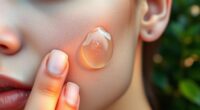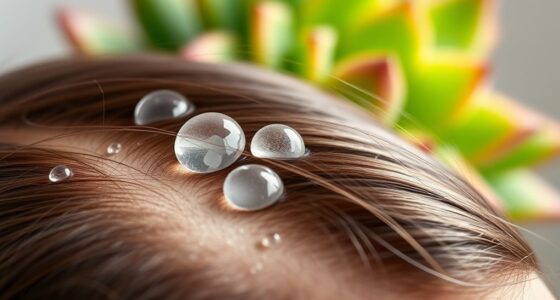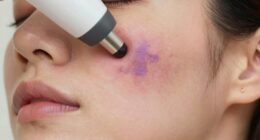Glycolic acid’s an excellent option for boosting scalp hydration and reducing dryness. It acts as a moisture magnet, keeping your scalp supple while exfoliating dead skin cells that can cause irritation. This gentle exfoliation also helps manage oils and product buildup, creating a healthier environment for your hair. Regular use, just once or twice a week, guarantees you maintain scalp health without overdoing it. Stick around to uncover more tips for enhancing your scalp care routine.
Key Takeaways
- Glycolic acid acts as a moisture magnet, significantly boosting scalp hydration and preventing dryness.
- It effectively exfoliates dead skin cells, improving moisture retention and relieving itchiness.
- Regular use manages oil and product buildup, helping maintain a balanced, healthy scalp environment.
- Suggested usage is once or twice a week to avoid over-exfoliation and irritation while enhancing hydration.
- Combining glycolic acid with essential oils can further improve scalp health and support hair growth.

If you struggle with a dry or flaky scalp, incorporating glycolic acid into your routine could be the solution you need. This powerful ingredient acts as a moisture magnet, markedly boosting scalp hydration. By doing so, it counters dryness and promotes a healthier environment for your scalp, enhancing overall scalp health. If you’ve been dealing with issues like seborrheic dermatitis or persistent dryness, you might find that glycolic acid can help alleviate those symptoms. Recent studies indicate that glycolic acid may also promote collagen production in the scalp, further supporting its health.
One of the standout benefits of glycolic acid is its ability to exfoliate dead skin cells effectively. When you gently remove these cells, you not only improve moisture retention but also prevent buildup that often leads to further dryness. If you’ve noticed that your scalp feels tight or itchy, using glycolic acid can help lift away those irritating flakes. Imagine a smoother, healthier scalp where dead skin cells don’t stand in the way of proper hydration. Additionally, incorporating essential oils for scalp health can further enhance your scalp’s condition. Regular use of glycolic acid can also improve air quality around your scalp, creating a more conducive environment for hair growth.
Glycolic acid effectively exfoliates dead skin cells, enhancing moisture retention and alleviating tightness and itchiness for a healthier scalp.
In addition to combating dryness, glycolic acid is particularly beneficial for those with an oily scalp. It helps manage excess oil and product buildup, which can disrupt the delicate balance of scalp hydration. By using glycolic acid, you can achieve a more balanced scalp environment, making it less prone to becoming dry or flaky. The key lies in maintaining that moisture level, and glycolic acid does just that.
Clinical studies reveal that this ingredient can markedly maintain moisture levels in the scalp, reducing the likelihood of hair breakage associated with dryness. When your scalp is properly hydrated, your hair is more resilient and less susceptible to damage. If you’re tired of dealing with brittle strands, incorporating glycolic acid could be a game-changer for you. Aromatic cleaning with essential oils can also complement your scalp care routine by improving overall scalp health.
For best results, consider using glycolic acid once or twice a week. This frequency allows you to enhance scalp hydration without the risk of over-exfoliation or irritation. You’ll appreciate how it can transform your scalp health while keeping dryness at bay.
Frequently Asked Questions
Does Glycolic Acid Help Dry Scalp?
Yes, glycolic acid can help with a dry scalp. It gently exfoliates dead skin cells and removes excess oil, which often contributes to dryness.
By boosting hydration levels, you’ll notice a significant improvement in scalp health. However, be cautious not to overuse it; applying glycolic acid treatments once a week is ideal.
This way, you can enjoy its benefits without risking irritation or weakened hair.
How Do You Hydrate Skin After Glycolic Acid?
After using glycolic acid, you need to hydrate your skin effectively.
Start by applying a hydrating serum or moisturizer with hyaluronic acid or glycerin right after exfoliation. This helps replenish moisture.
Don’t forget to include soothing ingredients like aloe vera or chamomile to calm any irritation.
Also, remember to drink plenty of water for overall hydration.
And, always let the glycolic acid absorb fully before layering on other products for maximum hydration benefits.
Is Glycolic Acid Drying or Hydrating?
Think of glycolic acid like a skilled gardener, gently pruning away dead leaves to help new growth flourish.
When you use it properly, it hydrates your scalp by attracting moisture, yet overdoing it can dry you out.
Stick to using it once or twice a week, and you’ll find a balance that keeps your scalp healthy and hydrated.
Can I Use Glycolic Acid on My Scalp Everyday?
You shouldn’t use glycolic acid on your scalp every day.
While it can help improve scalp health, daily application might lead to irritation, redness, and dryness.
It’s best to stick to using it once or twice a week. This way, you can enjoy smoother skin and fewer flakes without risking sensitivity.
Always monitor how your scalp responds and adjust your usage to keep it healthy and balanced.
Moderation is key!
Conclusion
Incorporating glycolic acid into your scalp routine can be a game-changer for hydration. It’s like giving your scalp a revitalizing drink of water, keeping it from feeling parched. By gently exfoliating and promoting moisture retention, you’re not just treating your strands but also ensuring your scalp feels its best. So, why not give this hydration hack a shot? Your scalp will thank you, and you’ll be rocking a healthy mane in no time—like a true hair royalty!








